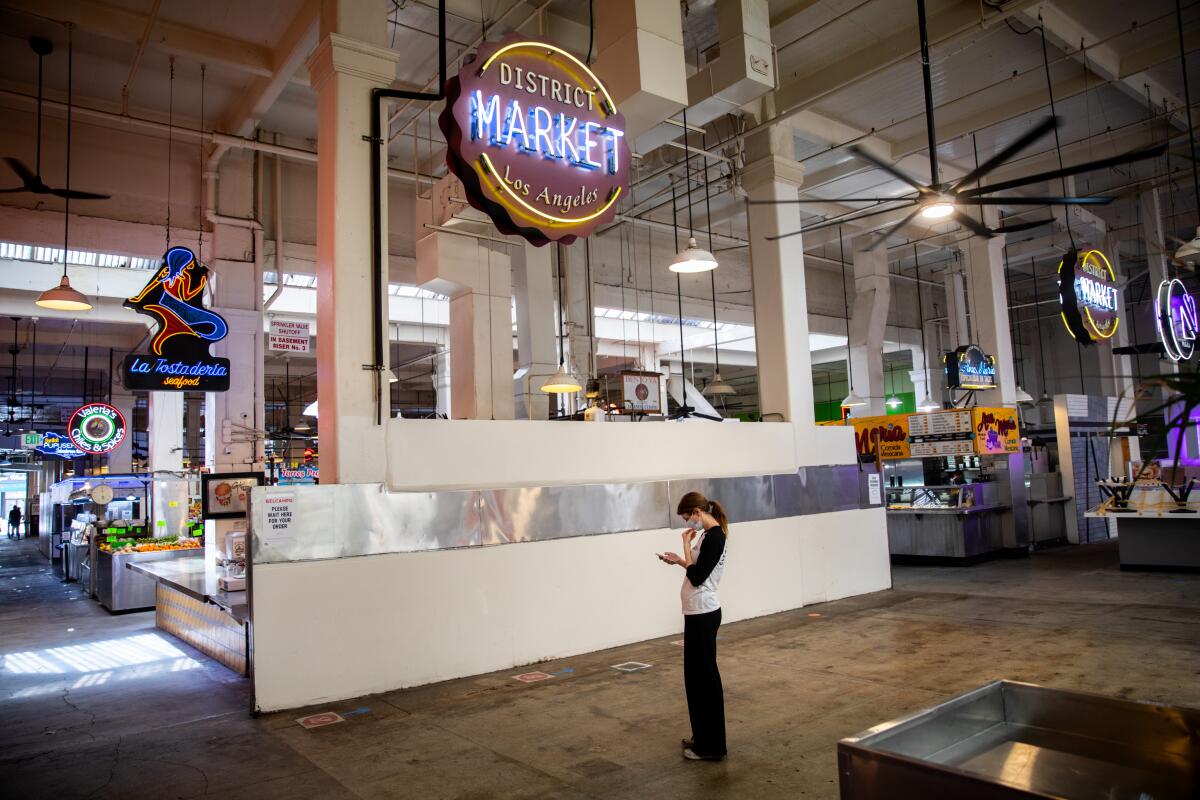Column: To regain trust, Belcampo must be more transparent

Belcampo manager Ellie Baker, pictured near the Grand Central Market location last year. The meat company has been accused of mislabeling products.
- Share via
It’s something we’ve seen more than once when a prominent business or person becomes enveloped in a controversy: The beautifully curated social media account falls silent. Comments are conspicuously turned off. Then there’s an apology, followed by a gradual reentering of the online world. You try to strike the right tone — contrite, but not overly so — and make a promise to do better.
We’re seeing a version of this scenario with Belcampo, the Oakland-based meat operation with its own Northern California farm, mail-order business and butcher shop-slash-restaurants (three are in the L.A. area). Its website touts “grass-fed and finished, pasture-raised meats directly from our climate positive CA farms” and menu items “filled with California farm-raised goodness.” The company was jump-started with $50 million from financier Todd Robinson, according to Forbes.
Belcampo and co-founder Anya Fernald’s social media accounts are filled with photos of juicy grilled meats, adorable farm animals and plenty of reminders of the ethos that propelled Belcampo to success: organic, sustainable and from Belcampo’s farm — bucolic, Ansel Adams-esque photos of which are splashed on the website. A three quarter pound package of strip steak currently sells on the website for $29.99 and a whole chicken for $50.99; you pay a premium for the advertised quality, as well as the messaging.
But was the messaging too good to be true?
After a former employee who was dismissed from the company posted video and photos to Instagram alleging that Belcampo sold meat from different producers and locations as far away as Australia as its own, the company admitted mistakes had been made. But an apology posted to Instagram on May 26 by Fernald and a Q&A posted on Belcampo’s website, both lengthy, leave more questions than answers. They don’t give much insight to what may be the most urgent question: How does a company end up selling one thing but saying it’s another?
The employee, Evan Reiner, who was working at Belcampo Santa Monica as a butcher when he shot the video, showed images of meat products that ranged in quality from excellent — grass-fed Cape Grim beef from Tasmania — to a large section of beef marked “USDA Choice” — the same grade you might get at a Safeway. A box of Mary’s Organic Chicken, commonly seen at Whole Foods and Bristol Farms, has “Belcampo” scrawled on it in one of the photos, as do boxes of Pasturebird chickens.
Reiner alleged Belcampo marked up meat from other producers and sold it as its own in the restaurant and butcher shop. “This company claims to be selling meat from their farm,” Reiner said in the video, “but it’s not true.”
Belcampo’s website states that its 30,000-acre farm in Gazelle, Calif., is the source of the “vast majority” of the meat it sells. It also lists a handful of partner farms used by the company: Big Bluff Ranch, Starwalker Farms, Chamberlin Ranch, Cal Heritage Farms, Campo Rojo and Blue Mountain Ranch.
In the Instagram post, Reiner claimed Belcampo ordered meat from two Southern California distributors, West Coast Prime and Rocker Bros. Meat & Provision, and passed it off as its own. West Coast Prime president Nathan Bennett declined to comment on the specific allegations but said in an emailed statement, “Product integrity and labeling is an important issue to West Coast and the industry.”
Rocker Bros. employee Ryan Grable acknowledged it provided meat “based on specific product needs” to Belcampo but would not say what those needs were. “At the end of the day we don’t have control over how they choose to utilize or represent their product to end consumers,” he added.
Could the mislabeling have been a simple mistake? Miguel Ortiz, a manager at Belcampo Santa Monica, allegedly asked employees, via text, to be “careful with Rocker Brothers” and suggested keeping those orders in the kitchen, which Reiner said was “way in the back where no one can see it.”
Belcampo declined to comment, and Ortiz did not respond to multiple requests for comment.
In her Instagram video, Fernald apologized for mislabeling that occurred at Belcampo Santa Monica but did not say if it had happened at other stores. She also said she had no prior knowledge of the problems. “I deeply apologize for the mislabeling and poor sourcing in our Belcampo Santa Monica location that I learned about from a video posted by our former employee,” Fernald said. She called the revelation “heartbreaking for me” and said it did not affect Belcampo’s mail-order business, only retail.
Fernald’s apology had plenty of buzzwords — a “culture of accountability” and “integrity” — and said, “I am committed to rebuilding” — but she didn’t say much about the extent of the misrepresentation: what happened, how it happened and for how long.
The Q&A Belcampo posted on its website to address the allegations (which has been edited at least once, according to an Eater L.A. article) feels flimsy and, like Fernald’s apology, doesn’t explain exactly how mislabeling occurred.
It states there were “multiple failures” in adherence to Belcampo’s “high standards.” Only a “small percentage” of products were affected, the website says, but there are no specifics. There is no mention of Pasturebird, National Beef or other companies shown in Reiner’s Instagram video, nor are West Coast Prime or Rocker Bros. mentioned.
The Q&A mentions only the Santa Monica location as having mislabeled meat, but in an email shared with The Times by Reiner, a manager at the West Hollywood location wrote in February that Belcampo was ordering meat from Rocker Bros. “as a cost-cutting measure.”
That manager, Ellie Baker, declined to comment and instead directed me to comments she had made on Reiner’s Instagram post. In those statements, Baker said, “Never has there been corn-fed beef or lamb in any of my stores.” She also added, “I disagree with putting outside source meat into a butcher case without a distinguishing label” but stopped short of saying it never occurred in stores she managed.
Belcampo declined to comment on this and other inquiries and sent an emailed statement through a representative that read, “Your questions are part of Belcampo’s ongoing audit into Restaurant and Butcher Shop operations, so we do not have more information to share at this time.”
Expensive meat shouldn’t be the issue here; good quality costs money. But for a place that has made sustainable, local product its bedrock — and has the prices to show for it — Belcampo should be far more transparent about its process of investigating the allegations by letting the public know exactly what went wrong.
Otherwise, smaller butchers and purveyors could end up paying the consequences — ones without Wall Street veterans bankrolling their operation. Dylan Carasco, who worked at Belcampo Santa Monica in 2015 and currently works as a butcher in Paris, said this controversy could harm consumer confidence in an industry where trust is already hard to come by.
“It’s absolutely damaging to the reputation [of the meat industry],” Carasco said. “It’s really frustrating.”
The average person, Carasco said, depends on the integrity of the butcher shop to know what’s what. “The entire foundation is based on [the idea that] you are buying what is being advertised,” he said.
“If you point at a rib-eye and ask if it’s grass-fed and the butcher says, ‘Yes,’ you’re going to believe him.”
Mills Stovall, owner of Waimea Butcher Shop on the island of Hawaii, said trust is essential to any good butcher shop. “A lot of times we’re more expensive than the grocery store. But what you get is honesty, you get transparency,” he said.
He said that since the Belcampo news broke, his shop has been fielding more questions than normal about the sourcing of its meat: “We’re getting questions from customers: ‘Do you know where it’s coming from? How do you know? Do you promise I can trust you?’”
Stovall said he fears the fallout could adversely affect mom-and-pop shops in the meat industry. “This has been a really bad thing, and I feel bad for all the butcher shops in Northern and Southern California,” he said.
Accountability is great in concept but can be difficult to execute. In this instance, we haven’t gotten the answers we need. If it hopes to regain trust, Belcampo should swallow the bitter pill and be fully transparent.
What does farm-to-table mean, anyway, if you don’t know where the farm is?
More to Read
Eat your way across L.A.
Get our weekly Tasting Notes newsletter for reviews, news and more.
You may occasionally receive promotional content from the Los Angeles Times.











